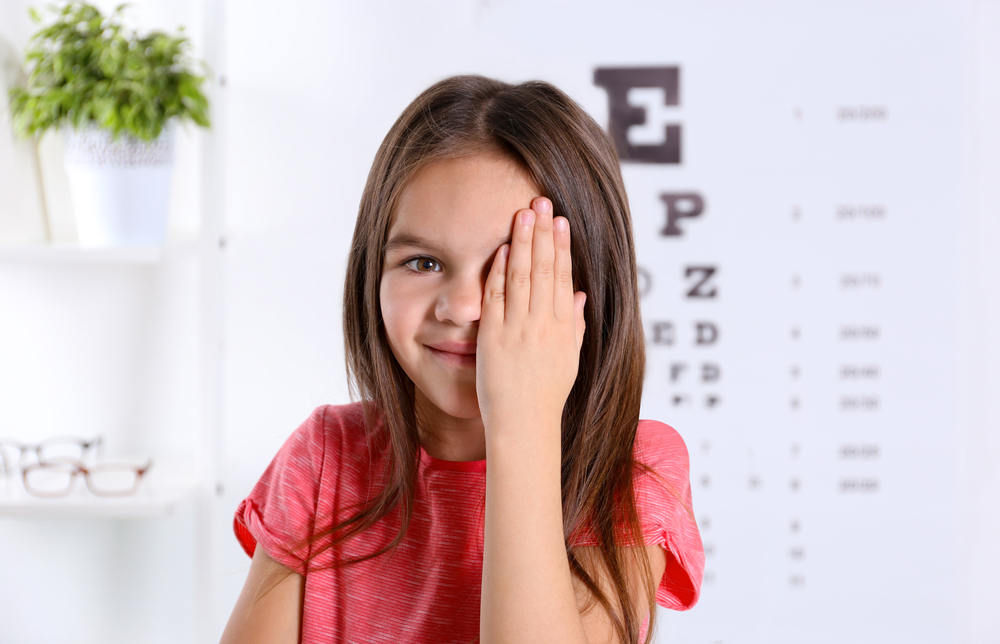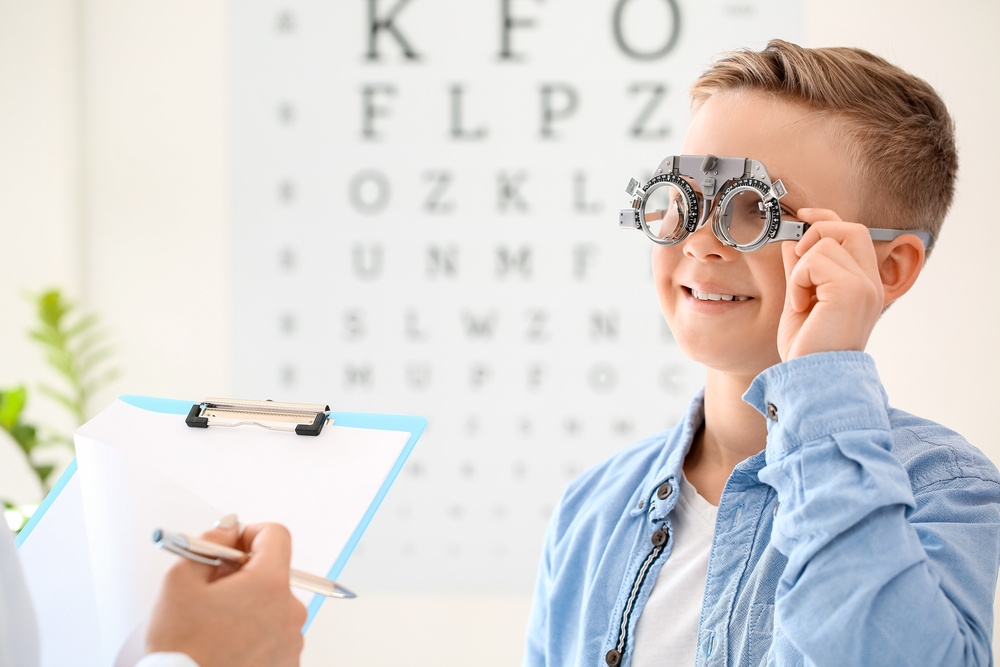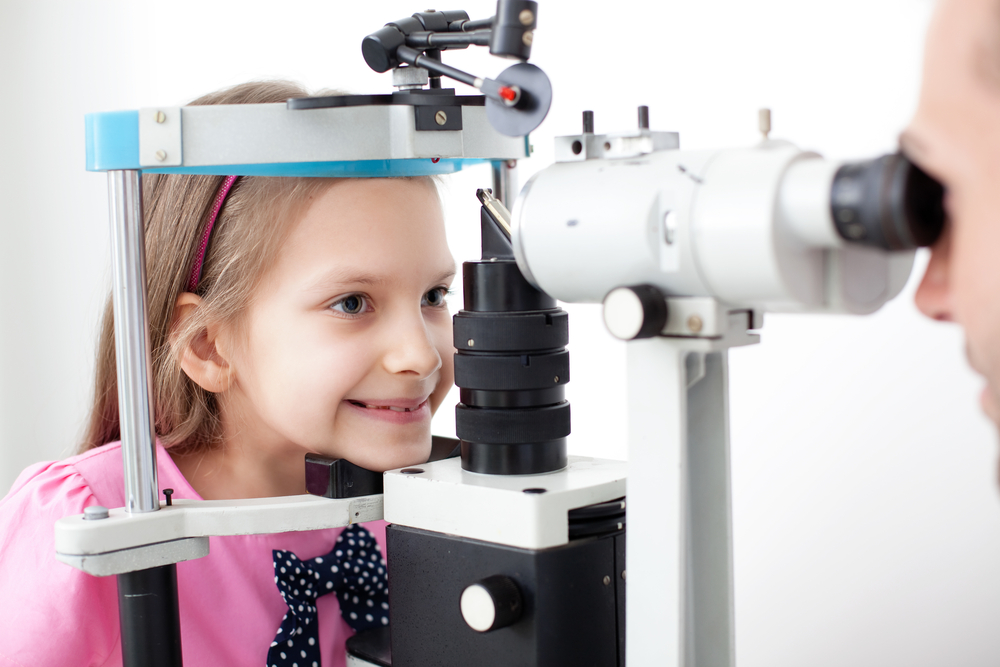Recent studies have shown that more and more children are being diagnosed with myopia, or near-sightedness, than ever before. With the incidence of myopia in children on the rise, it is more important than ever for children to have regular pediatric eye exams.
Regular eye exams are the best way to catch vision problems early before they can start to affect a child’s academic performance. Keep reading to learn more about the importance of pediatric exams and how vision issues may cause your child to struggle in school!
How Can Vision Problems Affect Children in School?

If your child is in school, an undiagnosed vision problem can affect their ability to learn and be a productive member of the classroom. If they have uncorrected myopia, they may have difficulty seeing the blackboard or other learning materials from a distance.
Children with undiagnosed hyperopia, or farsightedness, may be able to see the blackboard but struggle to read text that is close to them, like words in a book or on a worksheet. The inability to see clearly close up can affect their ability to read at grade level or perform well on tests.
The difficulty of seeing clearly at school can have a serious impact on your child’s school experience. Children with untreated vision problems may struggle academically or be incorrectly diagnosed with learning disabilities.
Vision problems in children can develop slowly, so they are not always aware their vision is becoming compromised. Children might not think to tell a parent or caregiver about any changes that are occurring with their vision.
What Happens During a Pediatric Eye Exam?
The best way to ensure your child’s eyesight is school-ready is with regular pediatric eye exams. These exams are non-invasive and painless, taking between thirty minutes and an hour to complete.
During a pediatric eye exam, your child’s eye care provider at Nevada Eye Physicians will perform a series of tests to check the quality of your child’s vision and the health of their eyes. These tests include:
Eye Muscle and Pupil Testing
Your eye care provider will begin by doing a full visual examination of your child’s eye and eye area, looking for particular eye muscle reactions and the responsiveness of the pupil to light.
Visual Acuity Test

The visual acuity test is one of the most important tests performed by an eye doctor. During this test, your child will be asked to read lines of letters or shapes in rows of diminishing size to determine the strength of their vision.
This test is often done at a distance and near to determine if your child may be struggling to be able to see well enough to read or look at things far away.
Corneal Light Reflex Test
For this test, your eye care provider will shine a small flashlight onto your child’s cornea to see how light is reflected. This may help them determine if your child may have an eye that turns out, in, up, or down, affecting their vision.
Cover Test
Your child will be asked to cover one eye at a time as your eyecare provider looks for shifts in the eye when alternating which eye has focus. This test checks for eye misalignment, similar to the corneal light reflex test.
Dilated Eye Exam
Depending on your child’s age, your eye care provider may recommend a dilated eye exam to more closely examine the structures within the eye, including the cornea, iris, lens, and retina. While eye dilation can feel strange to a child, the effects of the special drops used to dilate their eyes wear off quickly.
In addition to visual acuity and eye health, the tests performed at a pediatric eye exam check for specific visual skills like eye focus, eye tracking, eye teaming, hand-eye coordination, and visual perception.
How Often Should Children Have a Pediatric Eye Exam?
To ensure a lifetime of healthy vision, it is recommended that children receive their first comprehensive baseline eye exam when they are between the ages of six and twelve months. The purpose of this first exam is to check that their eyes are developing normally.

Between the ages of three and five, children should have at least one comprehensive eye exam to check for any vision problems or eye conditions that may be developing. They should then have another complete eye exam before they start first grade.
Once your children are in school full-time, it is advisable to schedule yearly eye exams. A yearly eye exam is the best way to be sure that their vision stays clear and healthy.
A yearly pediatric eye exam is especially important if your young child is already wearing glasses. Children’s eyes can change rapidly as they grow, so a yearly exam ensures that their vision prescription stays accurate.
Parents and caregivers should also be on the lookout at home for common signs of potential vision issues. These signs can include constant eye rubbing, needing to sit closer or further away from the television or a computer screen, complaints of blurry vision, or frequent squinting.
What are the Other Benefits of Pediatric Eye Exams?
Pediatric eye exams have benefits beyond academic achievement. Scheduling regular eye exams can:
- Help maintain the overall health of your children’s eyes
- Prevent long-term eye conditions
- Monitor developmental milestones
- Provide an opportunity to discuss the healthy use of electronic devices
- Address eye safety concerns and the importance of eye injury prevention
If your child is struggling at school, poor eyesight could be to blame. You can ensure that your child’s vision remains clear and healthy as they grow and learn by scheduling regular, comprehensive pediatric eye exams!
Is it time for your child to have an eye exam? Schedule an appointment at Nevada Eye Physicians in Las Vegas, NV, today!



